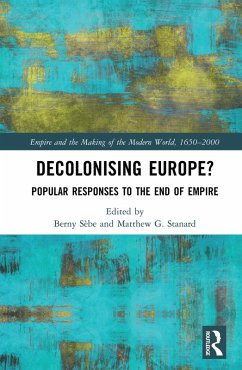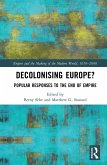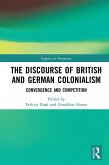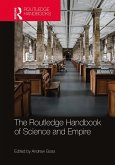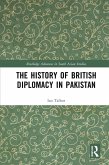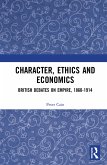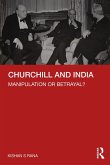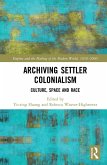Decolonising Europe? (eBook, ePUB)
Popular Responses to the End of Empire
Redaktion: Sèbe, Berny; Stanard, Matthew G.
45,95 €
45,95 €
inkl. MwSt.
Sofort per Download lieferbar

23 °P sammeln
45,95 €
Als Download kaufen

45,95 €
inkl. MwSt.
Sofort per Download lieferbar

23 °P sammeln
Jetzt verschenken
Alle Infos zum eBook verschenken
45,95 €
inkl. MwSt.
Sofort per Download lieferbar
Alle Infos zum eBook verschenken

23 °P sammeln
Decolonising Europe? (eBook, ePUB)
Popular Responses to the End of Empire
Redaktion: Sèbe, Berny; Stanard, Matthew G.
- Format: ePub
- Merkliste
- Auf die Merkliste
- Bewerten Bewerten
- Teilen
- Produkt teilen
- Produkterinnerung
- Produkterinnerung

Bitte loggen Sie sich zunächst in Ihr Kundenkonto ein oder registrieren Sie sich bei
bücher.de, um das eBook-Abo tolino select nutzen zu können.
Hier können Sie sich einloggen
Hier können Sie sich einloggen
Sie sind bereits eingeloggt. Klicken Sie auf 2. tolino select Abo, um fortzufahren.

Bitte loggen Sie sich zunächst in Ihr Kundenkonto ein oder registrieren Sie sich bei bücher.de, um das eBook-Abo tolino select nutzen zu können.
Decolonising Europe? offers a new paradigm to understand decolonisation in Europe, showing how it was fundamentally a fluid process of fluxes and refluxes involving not only transfers of populations, ideas and socio-cultural practices across continents but also complex intra-European political dynamics.
- Geräte: eReader
- mit Kopierschutz
- eBook Hilfe
Andere Kunden interessierten sich auch für
![Decolonising Europe? (eBook, PDF) Decolonising Europe? (eBook, PDF)]() Decolonising Europe? (eBook, PDF)45,95 €
Decolonising Europe? (eBook, PDF)45,95 €![The Discourse of British and German Colonialism (eBook, ePUB) The Discourse of British and German Colonialism (eBook, ePUB)]() The Discourse of British and German Colonialism (eBook, ePUB)45,95 €
The Discourse of British and German Colonialism (eBook, ePUB)45,95 €![The Routledge Handbook of Science and Empire (eBook, ePUB) The Routledge Handbook of Science and Empire (eBook, ePUB)]() The Routledge Handbook of Science and Empire (eBook, ePUB)43,95 €
The Routledge Handbook of Science and Empire (eBook, ePUB)43,95 €![The History of British Diplomacy in Pakistan (eBook, ePUB) The History of British Diplomacy in Pakistan (eBook, ePUB)]() Ian TalbotThe History of British Diplomacy in Pakistan (eBook, ePUB)42,95 €
Ian TalbotThe History of British Diplomacy in Pakistan (eBook, ePUB)42,95 €![Character, Ethics and Economics (eBook, ePUB) Character, Ethics and Economics (eBook, ePUB)]() Peter CainCharacter, Ethics and Economics (eBook, ePUB)43,95 €
Peter CainCharacter, Ethics and Economics (eBook, ePUB)43,95 €![Churchill and India (eBook, ePUB) Churchill and India (eBook, ePUB)]() Kishan S RanaChurchill and India (eBook, ePUB)42,95 €
Kishan S RanaChurchill and India (eBook, ePUB)42,95 €![Archiving Settler Colonialism (eBook, ePUB) Archiving Settler Colonialism (eBook, ePUB)]() Archiving Settler Colonialism (eBook, ePUB)43,95 €
Archiving Settler Colonialism (eBook, ePUB)43,95 €-
-
-
Decolonising Europe? offers a new paradigm to understand decolonisation in Europe, showing how it was fundamentally a fluid process of fluxes and refluxes involving not only transfers of populations, ideas and socio-cultural practices across continents but also complex intra-European political dynamics.
Dieser Download kann aus rechtlichen Gründen nur mit Rechnungsadresse in A, B, BG, CY, CZ, D, DK, EW, E, FIN, F, GR, HR, H, IRL, I, LT, L, LR, M, NL, PL, P, R, S, SLO, SK ausgeliefert werden.
Produktdetails
- Produktdetails
- Verlag: Taylor & Francis eBooks
- Seitenzahl: 298
- Erscheinungstermin: 1. April 2020
- Englisch
- ISBN-13: 9780429639371
- Artikelnr.: 59014482
- Verlag: Taylor & Francis eBooks
- Seitenzahl: 298
- Erscheinungstermin: 1. April 2020
- Englisch
- ISBN-13: 9780429639371
- Artikelnr.: 59014482
- Herstellerkennzeichnung Die Herstellerinformationen sind derzeit nicht verfügbar.
Berny Sèbe is Senior Lecturer in Colonial and Post-Colonial Studies at the University of Birmingham, UK Matthew G. Stanard is Professor of History at Berry College, USA
Introduction: Making Sense of the End of Empire: Fluxes and Flows in
Decolonising Europe?
PART I
Meaning: Making Sense of Decolonisation
1. Magna Carta and the End of Empire
2. The End of Empire and the Four Nations
3. Reverberations of Decolonisation: British Approaches to Governance in
Post-colonial Africa and the Rise of the 'Strong Men'
PART II
Media: Words and Images of the End of Empire
4. The Semantics of Decolonisation: The Public Debate on the New Guinea
Question in the Netherlands, 1950-62
5. Decolonisation and the Press: A Path to Pluralism in Franco's Spain, ca.
1950-75
PART III
Memory: Recalling Empire in Post-imperial Worlds
6. Afterlives of Colonialism in the Everyday: Street Names and the
(Un)Making of Imperial Debris
7. Passing the Point of No Return: Italy's Regretted End of Empire and the
Mogadishu Massacre of 1948
8. Oases of Imperial Nostalgia: British and French Desert Memories after
Empire
9. Questioning Portugal's Social Cohesion, and Preparing Post-imperial
Memory: Returned Settlers (retornados) and Portuguese Society, 1975-80
PART IV
Material Culture: Tactile Rémanences
10. Ephemera and the Dynamics of Colonial Memory
11. Domestic Museums of Decolonisation? Objects, Colonial Officials, and
the Afterlives of Empire in Britain
12. Decongolizing Europe? African Art and Post-Colony Belgium
PART V
Momentum: Decolonisation and its Aftermath
Afterword: Diverging Experiences of Decolonisation
Decolonising Europe?
PART I
Meaning: Making Sense of Decolonisation
1. Magna Carta and the End of Empire
2. The End of Empire and the Four Nations
3. Reverberations of Decolonisation: British Approaches to Governance in
Post-colonial Africa and the Rise of the 'Strong Men'
PART II
Media: Words and Images of the End of Empire
4. The Semantics of Decolonisation: The Public Debate on the New Guinea
Question in the Netherlands, 1950-62
5. Decolonisation and the Press: A Path to Pluralism in Franco's Spain, ca.
1950-75
PART III
Memory: Recalling Empire in Post-imperial Worlds
6. Afterlives of Colonialism in the Everyday: Street Names and the
(Un)Making of Imperial Debris
7. Passing the Point of No Return: Italy's Regretted End of Empire and the
Mogadishu Massacre of 1948
8. Oases of Imperial Nostalgia: British and French Desert Memories after
Empire
9. Questioning Portugal's Social Cohesion, and Preparing Post-imperial
Memory: Returned Settlers (retornados) and Portuguese Society, 1975-80
PART IV
Material Culture: Tactile Rémanences
10. Ephemera and the Dynamics of Colonial Memory
11. Domestic Museums of Decolonisation? Objects, Colonial Officials, and
the Afterlives of Empire in Britain
12. Decongolizing Europe? African Art and Post-Colony Belgium
PART V
Momentum: Decolonisation and its Aftermath
Afterword: Diverging Experiences of Decolonisation
Introduction: Making Sense of the End of Empire: Fluxes and Flows in
Decolonising Europe?
PART I
Meaning: Making Sense of Decolonisation
1. Magna Carta and the End of Empire
2. The End of Empire and the Four Nations
3. Reverberations of Decolonisation: British Approaches to Governance in
Post-colonial Africa and the Rise of the 'Strong Men'
PART II
Media: Words and Images of the End of Empire
4. The Semantics of Decolonisation: The Public Debate on the New Guinea
Question in the Netherlands, 1950-62
5. Decolonisation and the Press: A Path to Pluralism in Franco's Spain, ca.
1950-75
PART III
Memory: Recalling Empire in Post-imperial Worlds
6. Afterlives of Colonialism in the Everyday: Street Names and the
(Un)Making of Imperial Debris
7. Passing the Point of No Return: Italy's Regretted End of Empire and the
Mogadishu Massacre of 1948
8. Oases of Imperial Nostalgia: British and French Desert Memories after
Empire
9. Questioning Portugal's Social Cohesion, and Preparing Post-imperial
Memory: Returned Settlers (retornados) and Portuguese Society, 1975-80
PART IV
Material Culture: Tactile Rémanences
10. Ephemera and the Dynamics of Colonial Memory
11. Domestic Museums of Decolonisation? Objects, Colonial Officials, and
the Afterlives of Empire in Britain
12. Decongolizing Europe? African Art and Post-Colony Belgium
PART V
Momentum: Decolonisation and its Aftermath
Afterword: Diverging Experiences of Decolonisation
Decolonising Europe?
PART I
Meaning: Making Sense of Decolonisation
1. Magna Carta and the End of Empire
2. The End of Empire and the Four Nations
3. Reverberations of Decolonisation: British Approaches to Governance in
Post-colonial Africa and the Rise of the 'Strong Men'
PART II
Media: Words and Images of the End of Empire
4. The Semantics of Decolonisation: The Public Debate on the New Guinea
Question in the Netherlands, 1950-62
5. Decolonisation and the Press: A Path to Pluralism in Franco's Spain, ca.
1950-75
PART III
Memory: Recalling Empire in Post-imperial Worlds
6. Afterlives of Colonialism in the Everyday: Street Names and the
(Un)Making of Imperial Debris
7. Passing the Point of No Return: Italy's Regretted End of Empire and the
Mogadishu Massacre of 1948
8. Oases of Imperial Nostalgia: British and French Desert Memories after
Empire
9. Questioning Portugal's Social Cohesion, and Preparing Post-imperial
Memory: Returned Settlers (retornados) and Portuguese Society, 1975-80
PART IV
Material Culture: Tactile Rémanences
10. Ephemera and the Dynamics of Colonial Memory
11. Domestic Museums of Decolonisation? Objects, Colonial Officials, and
the Afterlives of Empire in Britain
12. Decongolizing Europe? African Art and Post-Colony Belgium
PART V
Momentum: Decolonisation and its Aftermath
Afterword: Diverging Experiences of Decolonisation
